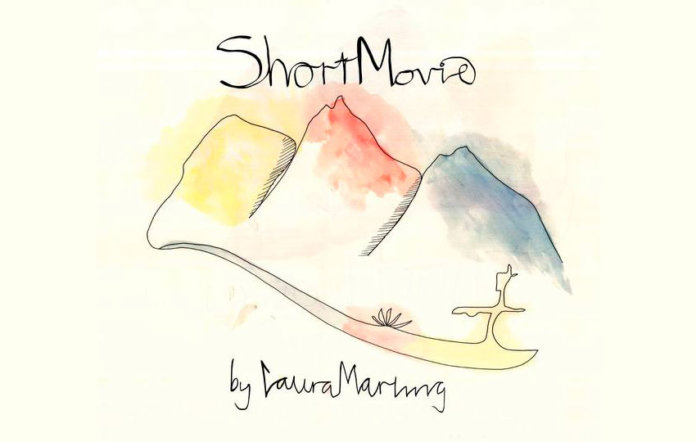As a result of her comparative youth and towering musical talent, it’s rarely noted that Laura Marling can be a very funny songwriter. Dryness is her strongest comic mode: she often sends up her own tendency towards capital-R romance, though usually it’s disappointing men who receive her withering glances. At the end of the closing number on 2013’s Once I Was An Eagle, a song cycle lamenting another relationship, she remarked, “Thank you naivety for failing me again/He was my next verse”. Marling’s acknowledgement heartbreak as songwriting chattel recalled her oft-cited forebear Joni Mitchell introducing a new song, “Love Or Money”, on her 1974 live album, Miles Of Aisles: “It’s a portrait of disappointment, my favourite theme.”
Short Movie, Marling’s fifth album in seven years, starts similarly. On “Warrior” she casts herself as a steed throwing off an unworthy rider who would only abandon her on his path to self-discovery anyway. She cites bloodied tracks and horses with no name, these cosmic Americana jokes about solitude that she accompanies with a swarming fog of sound effects and weighty fingerpicked acoustic guitar that wouldn’t have sounded amiss on Steve Gunn’s Way Out Weather. “Tasting the memory of pain I have endured/Wondering where am I go to? Well looking back on a bloody trail, you think that I should know”, she sings distantly.
So far, so droll; another beguiling entry in Marling’s symbolic scheme, where, as with Bill Callahan, the attributes and identities of various recurring creatures are rarely made clear. But then immediately after comes “False Hope”, where a seasick groan of strings gives way to her plaintive question, “Is it still okay that I don’t know how to be alone?” and a charging account of a crisis during a torrential New York City storm. For about the first time in her catalogue, Laura Marling sounds panicked about the future in the same way that most 25-year-olds are.
Short Movie is Marling’s LA album, where she moved following the release of …Eagle, and returned from a few months ago. Having rarely spent more than two or three weeks in one place since becoming famous age 16, she wanted to give permanence a shot. What initially ensued was a period of indulgent Californian solitude – abandoning music, spending nights alone at Joshua Tree and experimenting with psychedelic transcendental practices. But before long the rudderless life began to repel her and she had to return to earth.
On this record Marling begins to resemble another sceptical LA transplant, the gimlet-eyed writer Joan Didion. Quite literally on the bluesy “Gurdieff’s Daughter” and the intermittently breezy and grave “Don’t Let Me Bring You Down”, both of which cut to LA’s contradictory heart, where spirituality coexists with cutthroat ambition. Almost every song is rife with cynical rhetorical questions: she sounds jaded as she dismantles the motives of deceptive lovers on the rootsy, racing “Strange” and “Feel Your Love”, a baroque tangle of guitar strings and a low cello drone.
The chorus to “How Can I” does sound unfortunately like LeAnn Rimes’ “How Do I Live”, but it contains a calm distillation of Marling’s intention to reclaim her own youth on her own terms: “I’m taking more risks now/I’m stepping out of line/I put up my fists now until I get what’s mine”. Two songs later, the title track races to a warm stream of piercing strings and jaunty fiddle, and her comic jabs return, piercing the anxiety she that she briefly cultivated in LA about whether she was making a valuable contribution to the world: “I got up in the world today/Wondered who it was I could save/Who do you think you are?/Just a girl that can play guitar”. Marling’s fifth album takes vast steps forward musically, as ever: it’s more defiant and distinct than anything she’s done before, testament to her first go at self-production. But what really sets it apart from her catalogue is her desire to break the cycle, to let go and let herself be young. Next verse? It’s anyone’s guess, including hers.
Q&A
Laura Marling
After your six months off music, what drew you back in?
I got a bit worthy about whether being a musician was worthwhile to the planet: “Who do I think I am that I can just get up every day and play the guitar? That’s bullshit, I should be doing something more important.” But actually, that was the most self-important thought I’ve ever had, and only after being away from music for six months did I come back and think like, “actually, it’s pretty fucking great what I do, and I’m pretty fucking lucky to be doing it”. So my ego got a good bashing and it gave me proper perspective.
You’ve mentioned realising that you are actually young. Did you forget that because of constant remarks on your maturity, or something within you?
Probably both. Starting somewhere else completely fresh let me feel quite young. I’ve been having to conduct myself with the relatively functional level of grown-up-ness since I was 16, and I don’t think I let all that go but I allowed myself to take less control over things. That’s how I felt young again – just to stop trying to manipulate the world to how I think it should be.
It’s your first album that sounds panicked…
I hadn’t thought of it like that but that’s definitely how I felt. I felt suddenly awake, I felt like I was living in Blade Runner. I was like, “oh, holy shit, everything’s fucked and I am just one person in a giant country”.



